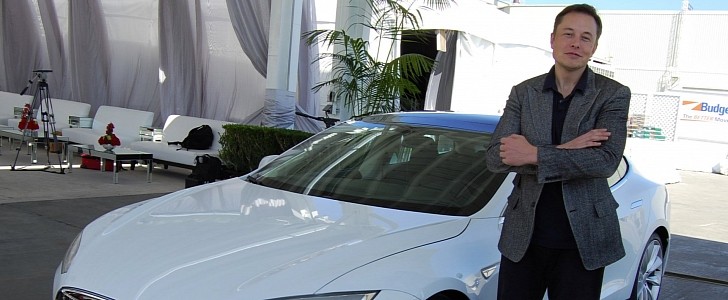When it comes to electric vehicles, many people still suffer from range anxiety. In fact, this is the number one cause that prevents wider EV adoption. It’s understandable why car companies scrambled to develop batteries that allow for an increased range, at least comparable with what ICE vehicles offer today. This is how Lucid Air’s 520-miles range became famous, but Elon Musk thinks this is not the way.
One of the most important parts of electric vehicle development is improving the batteries for bigger capacity and, of course, better range. Everyone wants an electric car that can go at least as far as an ICE vehicle, especially as topping up the battery takes a lot more time than filling up the tank. And yet, apart from some heavy-duty applications, having a longer range is not always sensible.
This comes down to the fact that, without a true battery breakthrough in sight, more range almost always means a bigger capacity battery. And this comes with a lot of problems, from the higher cost of production to adding more weight to the car. But ultimately there is the question of how much battery capacity is enough and how much is too much?
“We could’ve made a 600 mile Model S 12 months ago, but that would’ve made the product worse imo, as 99.9% of time you’d be carrying unneeded battery mass, which makes acceleration, handling & efficiency worse. Even our 400+ mile range car is more than almost anyone will use,” Elon Musk replied to a Twitter message from Tesla fan Whole Mars Catalog.
Of course, Musk might be cooling down some unrealistic expectations, but he also might have a point here. Li-Ion cells are light, but when packed together in large numbers, they tend to get heavier than the vehicle itself. This is why EVs are heavy, sometimes with ridiculous weights like what we’ve seen on the GMC Hummer EV.
What started years ago with 30-60-kWh battery packs has now got to insane capacities where 100 kWh is the minimum acceptable. Tesla is also there in terms of battery capacity, although we appreciate that Tesla vehicles are among the lighter EVs of the lot. And it’s not always weight that matters, it’s also that the batteries are expensive.
A 400-mile range is still more than what most people cover in one stint so maybe Elon Musk is right, at least for the mainstream electric vehicles. Improving the weight, the costs, and the charging times would bring more benefits to an electric vehicle and we’ve already seen Tesla working toward this goal with the 4680 cells and the structural battery.
We will probably see that a range race no longer makes sense above a certain distance, even though we don’t know now whether this is 400 miles (643 km) or 600 miles (965 km). Nevertheless, the race is still on when it comes to battery capacities, at least for some special applications. We’ve seen towing significantly reduce the range of an electric vehicle and this is one area where bigger battery capacity will always make sense.
This comes down to the fact that, without a true battery breakthrough in sight, more range almost always means a bigger capacity battery. And this comes with a lot of problems, from the higher cost of production to adding more weight to the car. But ultimately there is the question of how much battery capacity is enough and how much is too much?
“We could’ve made a 600 mile Model S 12 months ago, but that would’ve made the product worse imo, as 99.9% of time you’d be carrying unneeded battery mass, which makes acceleration, handling & efficiency worse. Even our 400+ mile range car is more than almost anyone will use,” Elon Musk replied to a Twitter message from Tesla fan Whole Mars Catalog.
Of course, Musk might be cooling down some unrealistic expectations, but he also might have a point here. Li-Ion cells are light, but when packed together in large numbers, they tend to get heavier than the vehicle itself. This is why EVs are heavy, sometimes with ridiculous weights like what we’ve seen on the GMC Hummer EV.
What started years ago with 30-60-kWh battery packs has now got to insane capacities where 100 kWh is the minimum acceptable. Tesla is also there in terms of battery capacity, although we appreciate that Tesla vehicles are among the lighter EVs of the lot. And it’s not always weight that matters, it’s also that the batteries are expensive.
A 400-mile range is still more than what most people cover in one stint so maybe Elon Musk is right, at least for the mainstream electric vehicles. Improving the weight, the costs, and the charging times would bring more benefits to an electric vehicle and we’ve already seen Tesla working toward this goal with the 4680 cells and the structural battery.
We will probably see that a range race no longer makes sense above a certain distance, even though we don’t know now whether this is 400 miles (643 km) or 600 miles (965 km). Nevertheless, the race is still on when it comes to battery capacities, at least for some special applications. We’ve seen towing significantly reduce the range of an electric vehicle and this is one area where bigger battery capacity will always make sense.
We could’ve made a 600 mile Model S 12 months ago, but that would’ve made the product worse imo, as 99.9% of time you’d be carrying unneeded battery mass, which makes acceleration, handling & efficiency worse. Even our 400+ mile range car is more than almost anyone will use.
— Elon Musk (@elonmusk) March 2, 2022







